16th April 2025
Fourteen gamers joined us for our one hundredth games session at the Corn Exchange, after starting the club in September 2019. Since then we have played 304 different games and the clear winner as most popular game is Ecosystem with 29 sessions. Other games with double digit session plays are Big Dig (12), Braggart (15), Concordia (12), Kingdomino (12), Seven Dragons (10) and Subastral (11).
Four players sat down to manage their Portuguese restaurants in House of Fado, which had been suggested ahead of time. This is a new game from Vital Lacerda, one of his shorter games which look at streamlining mechanisms from his larger games - in this case playing with the bumping mechanism from The Gallerist. Players are running their Fado Houses (restaurants which revolve around Fado bands, playing traditional music with a melancholic slant), promoting the musicians at their restaurants, attracting customers and impressing critics.
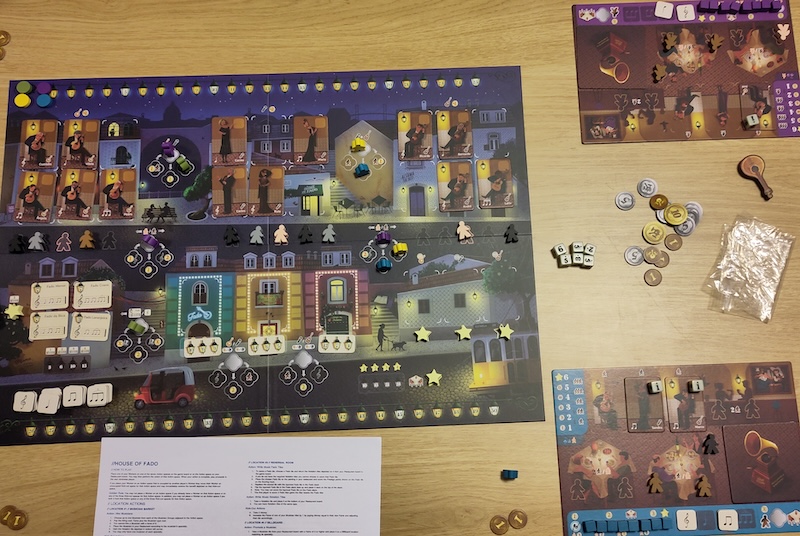
Each player controls 3 workers, with 8 action spaces available, 7 on the board and one on their restaurant. Moving onto an occupied space bumps the original worker into an adjoining area which grants them a bonus of some kind. The talk of the town is the Musician Market, where band members (Portuguese guitarist, classical guitarist, and the singer) can be hired. Then comes the street, where hawkers try to entice customers into their dens of inequity, or slip a critic a little cash to come and review said den. Billboards can be used to promote musicians once they have attained some renown, and there is a rehearsal room where new notes can be learnt, and new Fados (songs of infinite sadness) can be written.
Bringing a worker back to the restaurant shuts it for the night, earning cash from the paying customers eating at tables - tables for 2 and 3 are available to start with, with the grand 4 seater table being unlocked if the restaurant can gain enough prestige. Bar patrons can be attracted by some of the bump actions, although apparently they drink for free! All the customers can then applaud for their favourite musicians, earning them more fame, with certain customers preferring either the guitarists or the singer, and the rare grey customers liking either. If a critic had been present they give a glowing review of the restaurant, earning prestige - higher prestige leads to higher earnings from customers, makes critics cheaper, and possibly unlocks that big 4 seater table. Five stars are available for reaching certain checkpoints - being the first to get a musician to the heady heights of 6 fame, writing 3 Fados or gaining maximum prestige (your House of Fado becomes a mansion of Fado?), and end game is triggered once 3 of these stars have been claimed.
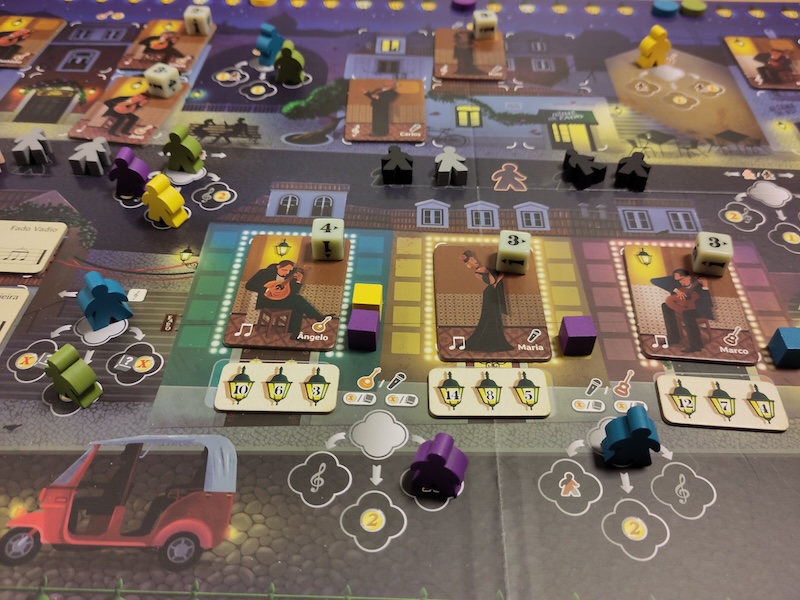
The game is meant to play in 45 to 60 minutes, so I’d foolishly assumed 80 minutes would be about right for a teaching game with new players (I had played against that most tricky of opponents, myself, ahead of time in order to show some semblance of understanding). Underestimation is my superpower!
After a not-too-rambling explanation, where I managed to only forget a few important rules we were off. I grabbed a critic quickly, hoping to boost my House’s fame, whilst Steph, Dave B and David B went for customers and musicians, with much attention being given to the avoidance of bumping others, although the limited spaces shortly stopped these shenanigans. Dave quickly switched to merrily manufacturing melancholy melodies, whilst David was stockpiling sounds for sad symphonies, only to keep witnessing the wished-for whimsies whisked from under his nose. I continued to woo critics, aiming for that big ol’ table, and Steph was simultaneously bumping up her singer’s fame, whilst getting distracted by the fact that said singer seemed to be the alter ego of our old nemesis Sandra from Kanban EV.
Soon there were several musicians being promoted, with some tactical play coming out as we vied for area control on the billboards for some of those shiny endgame points. Dave was first to grab one of the precious stars by getting one of his musicians up to 6 fame, whereby they went to reside in the Hall of Fame, signing autographs and writing memoirs. Being the birthplace of such a prestigious musician obviously gained a following for his House, as another soon reached the pinnacle of their career, but before he could write his third Fado and that third star, I coaxed yet another critic in (at the low, low cost of zero having already bribed…err, encouraged, multiple critics before) and hit maximum prestige to grab that third (Michelin) star, triggering the end game, and a desperate grab for scoring as the final round played out. Some big scoring took place here, with the final scores ranging in the 55-65 range, jumping from the 10-20-ish range at the end. I had obviously failed in my role as teacher as I just pipped it at the end, likely just because Dave had dithered slightly over writing that last Fado, not sure if he was in a good position to end the game.
The game went down well, we all enjoyed it, though we did manage to stretch this short game out to almost 2 hours (some of which was spent discussing Portuguese pronunciation v Spanish syllabification v the Brazilian beat to be fair) - must do better next time!
The rest of the gamers had two plays of Seven Dragons while waiting to see how many more people would arrive.
Then everyone split into two, trying Planet Unknown and Imperial 2030.
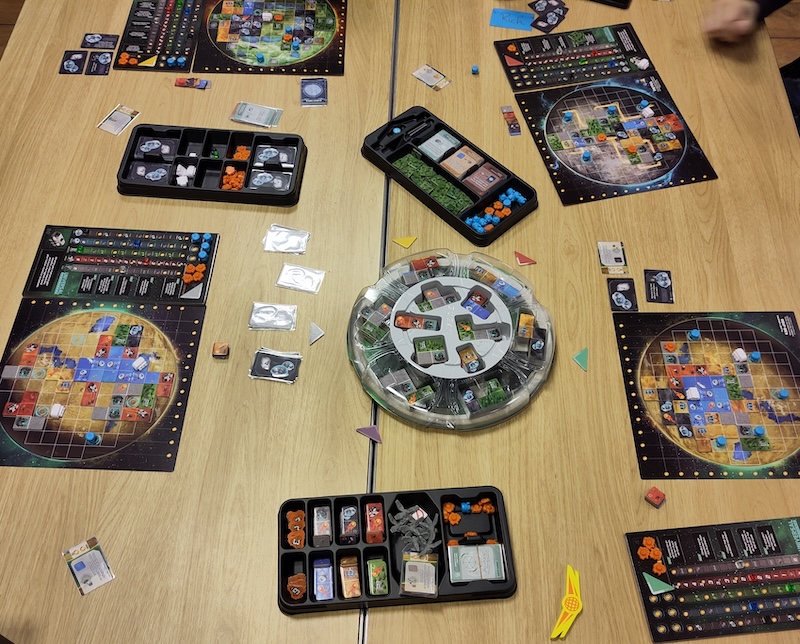
Planet Unknown was back with five players, two new, so after a quick run down of the rules the more experienced players were handicapped with special planets but everyone had the same basic corporation. Richie chose the energy planet Petra, Kathy the populated planet Gaia and Jeremy the Swiss cheese planet Lacuna. The players successfully survived to the twentieth event rather than finishing early by being unable to place a tile. When the scores were totalled up it was new player Sophie that was victorious by one point with her good scoring from planet coverage, resource tracks and meteorites. Kathy and Jeremy were joint second and Richie and Matt trailed a little further behind.
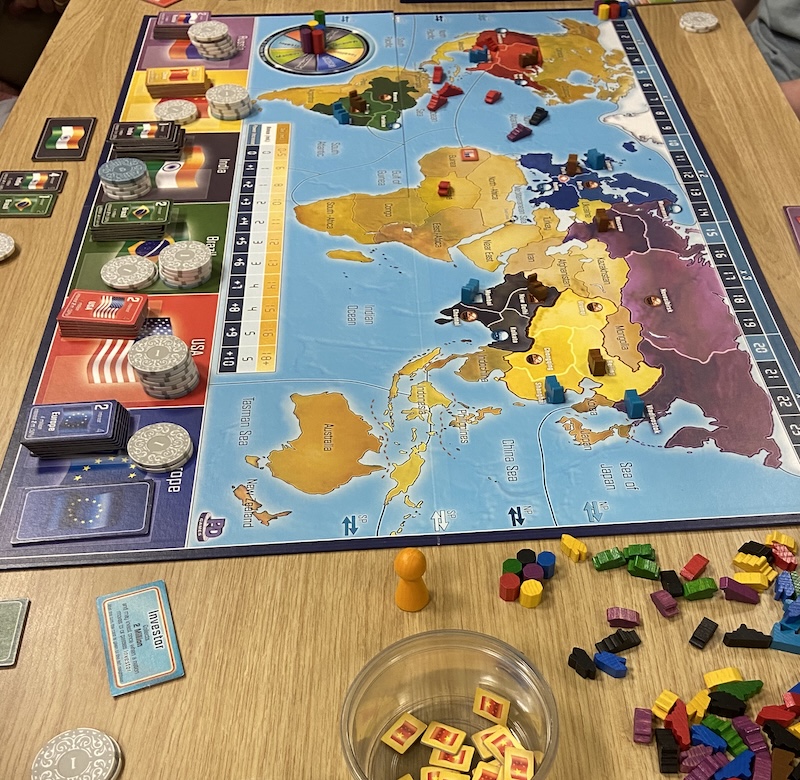
Imperial 2030 is a slightly reworked version of Imperial by Mac Gerdts, the same designer as Concordia (which has been noted as a club favourite as we reach our 100th session); you can see some ideas from 2013’s Concordia starting all the way back in 2006/2009’s Imperial. Imperial is one of Mac Gerdts’ so-called rondel games, where players select actions by moving a marker around a rondel - you can go a number of steps for free or pay to go a bit further, naturally the actions on the rondel are laid out to make that choice difficult. Imperial is also secretly a train game… well, a stocks and shares game, because players are not actually any of the imperial powers as such. Rather like A War of Whispers, the players are hidden back room capitalists that prop up imperial powers by buying bonds then claiming interest on those bonds. However, in Imperial the player controlling a power can change - whoever has the most bonds is in charge, and as players buy more bonds powers can shift. At which point, the new controlling player might have a very different interest in the powers actions and position on the board. Powers score power points, once one power hits 25 the game is over and players bond holdings are added up (with a variable multiplier) plus money on hand. So in the end, it’s only money that counts… the state of the world/powers is irrelevant.
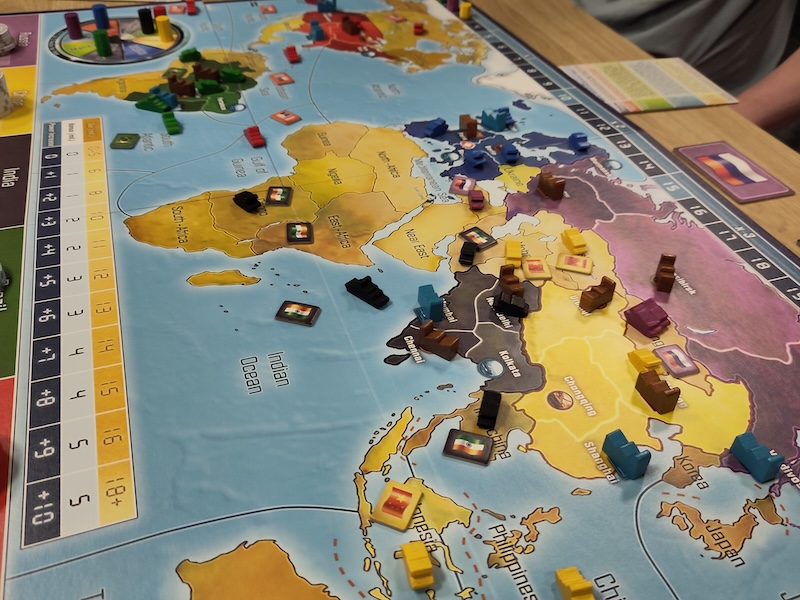
For this session, five of us sat down to play with four new to the game. It took a couple of rounds to feel the game out, but then people started to get the flow of actions around the rondel. There were the beginnings of (non-binding) negotiations/agreements and the slow realisation that players need to keep each other in check, the game certainly won’t.
So yeah, the theme of players being puppet masters driving imperial powers to build armies and wage wars - to the point where you might control two powers and deliberately make them “go to war” to make yourself more money is… questionable. Perhaps more so in the current era. It’s no worse than any war game, but certainly worth a comment.
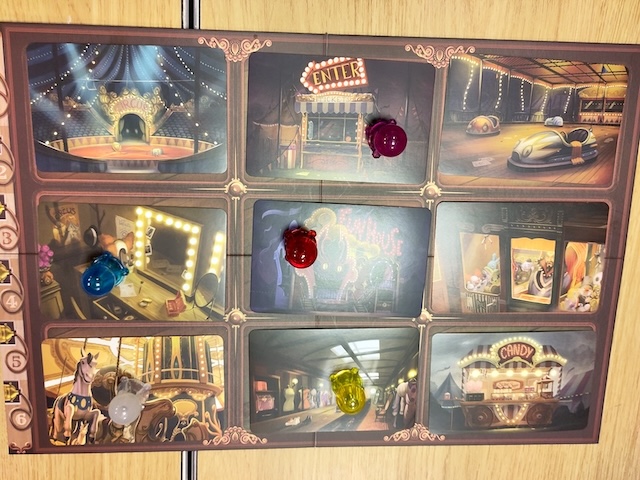
As the more peaceful games of planet terraforming and restaurant management finished much faster than the planetary domination those tables joined up and tried Mysterium Park for some more ghost assisted murder solving. The ghost (actually a partnership of 2 ghosts choosing the visions) was on form that night with the innocent and murder-free places narrowed down in just four rounds. In the final round the investigators had to cooperatively choose the correct combination of murderer and location from just two vision cards one depicting each but with no clues as to which vision referred to which. Here despite having two redraws the ghosts started lacking inspiration before selecting the two cards, fortunately after much discussion the investigators decided that the visions couldn’t possibly refer to the other two combinations so it would have to be the mechanic at the dodgems, which was correct. Case solved.
Session 101 is the 30th April. Join us for the next evening and see what new or favourite games have been brought along or make some suggestions on Discord and we will see what can be arranged.
- Total Session Attendance: 14
-
Board Games: